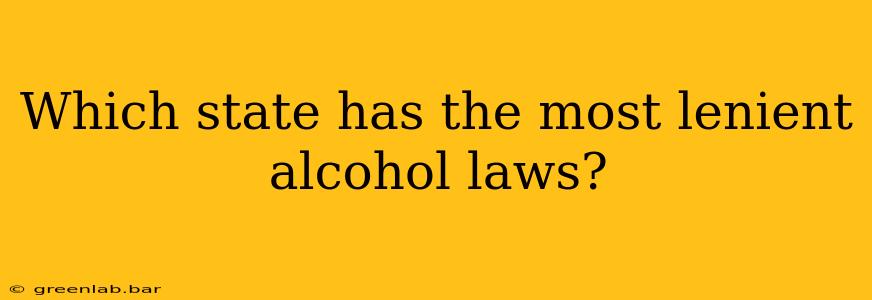Which State Has the Most Lenient Alcohol Laws? Navigating the Complexities of State-by-State Regulations
Determining the "most lenient" state regarding alcohol laws is tricky. What constitutes "lenient" depends heavily on individual priorities. One person might prioritize low drinking ages, while another focuses on relaxed licensing restrictions for businesses. This exploration will delve into several key aspects of alcohol laws across the United States, allowing you to form your own informed conclusion.
Understanding the Nuances of Alcohol Legislation: State alcohol laws are a complex patchwork, varying dramatically across the country. They regulate numerous aspects, including:
-
Minimum Drinking Age (MDA): While federally mandated at 21, some states have explored or implemented exceptions for specific circumstances (e.g., religious contexts or with parental supervision). However, these are often limited.
-
Alcohol Purchase and Possession: Laws surrounding who can buy and possess alcohol differ. Some states have stricter regulations concerning open containers in vehicles, while others are more relaxed. Possession limits for personal consumption also vary.
-
Licensing and Regulations for Businesses: The ease of obtaining licenses for breweries, wineries, distilleries, bars, and restaurants differs significantly. Some states have streamlined processes and fewer restrictions, while others have more stringent requirements and higher fees.
-
Alcohol Sales Regulations: States differ in their regulations regarding Sunday sales, hours of operation for liquor stores, and the types of establishments permitted to sell alcohol. Some states allow grocery stores to sell hard liquor, while others restrict sales to dedicated liquor stores.
-
Open Container Laws: These vary greatly; some states prohibit open containers in vehicles entirely, while others permit them under certain conditions.
States Often Cited for More Relaxed Regulations:
Several states consistently appear in discussions about relaxed alcohol regulations. However, it's crucial to understand that "relaxed" is relative:
-
Oregon: Oregon is frequently highlighted due to its relatively permissive alcohol sales regulations, including allowing grocery stores and other businesses to sell alcohol.
-
California: California's extensive wine industry and its comparatively straightforward licensing process for breweries and wineries often place it in this discussion. However, other aspects of California's alcohol laws aren't necessarily "lenient."
-
Nevada: Nevada's reputation as a gambling and entertainment hub translates to relatively liberal alcohol sales laws, though regulations still vary regionally.
Important Considerations:
It's vital to avoid the pitfall of equating relaxed business regulations with a universally "lenient" alcohol environment. Some states may have easy licensing for businesses while maintaining strict penalties for DUI or underage drinking. It's also crucial to note that laws are subject to change, so always refer to the most up-to-date information from the relevant state's Alcoholic Beverage Control (ABC) agency or similar governing body.
Further Research: To make your own informed assessment, research the individual alcohol laws of states that interest you. Consult the respective state ABC websites for detailed and accurate information.
Disclaimer: This information is for educational purposes only and does not constitute legal advice. Always consult with legal professionals for advice concerning specific alcohol-related legal issues.

